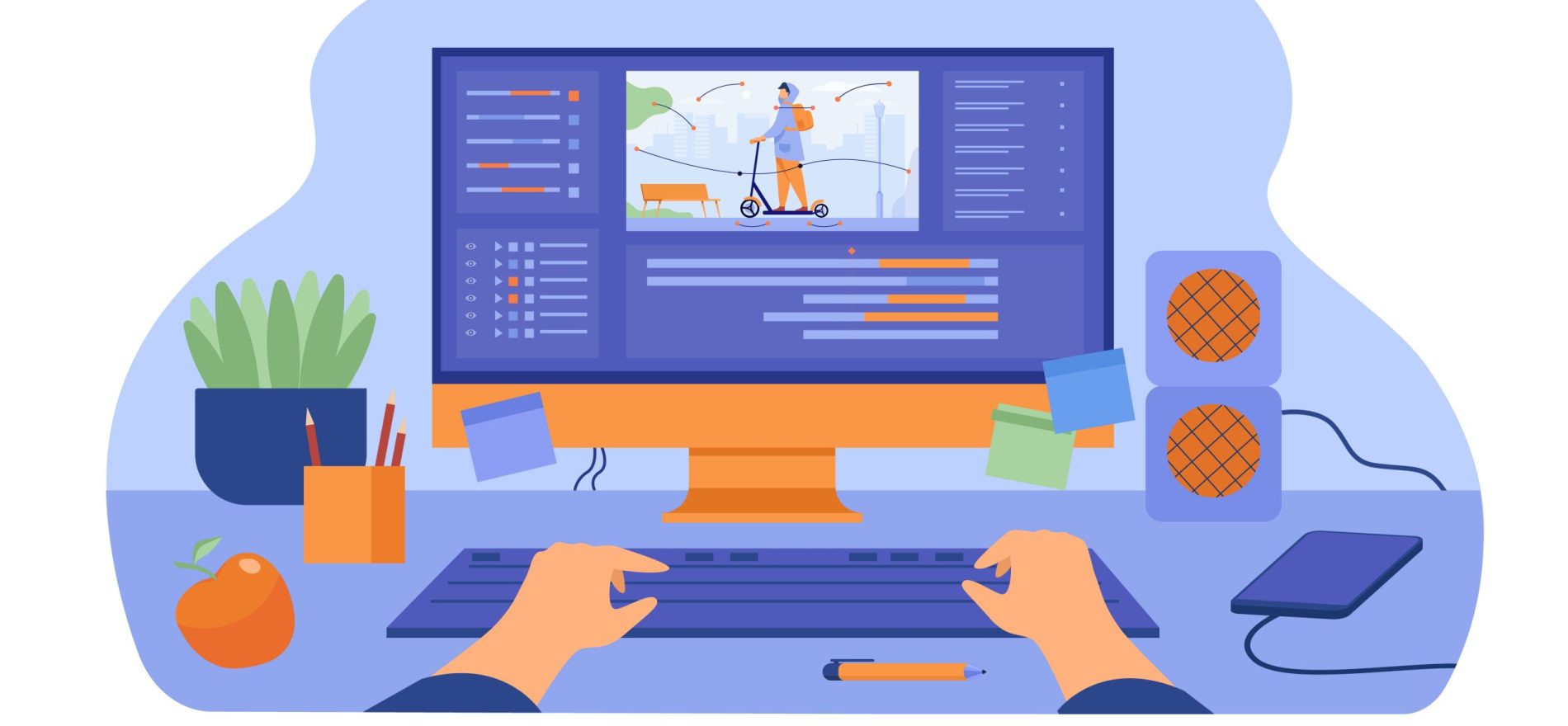The landscape of job roles is evolving, with web editor positions becoming increasingly prevalent as companies transition from traditional print products to the digital realm. In this changing landscape, a web editor assumes a pivotal role in strategizing and curating content for websites and social media platforms. By comprehending the responsibilities intrinsic to the position of a web editor, you can strategically cultivate the proficiencies essential for pursuing a career in this domain.
This article delves into the core essence of a web editor’s role, elucidates their tasks, explores the path to becoming a web editor, and highlights the key skills that underpin success in this dynamic role. Discovering how to become a web editor involves a combination of education, experience, and a comprehensive skill set tailored to the digital landscape.
Table of Content
What is a Web Editor?
Web Editor Job Description
5 Essential Steps to Become an Event Planner
1. Get a College Degree
2. Attain an Internship
3. Gain Writing Experience
4. Understand Metrics
5. Learn Basic Web Design Programs
Web Editor Salary and Job Outlook
Skills For Web Editors
Conclusion
What is a Web Editor?
A web editor is an individual immersed in the realm of digital content. Their responsibilities encompass tasks such as crafting website copy, composing emails, and contributing to social media updates. The scope of a web editor’s work extends to various content forms, encompassing videos and images. Diverse sectors, including marketing, journalism, and advertising, harness the skills of web editors. Moreover, sizable enterprises often enlist the services of web editors to oversee and enhance their online visibility.
Web Editor Job Description
A web editor’s primary responsibilities revolve around the conception and presentation of digital content. Below are several tasks that a web editor may undertake:
- Writing Copy: Web editors engage in crafting various types of content, including blogs, internal web pages, email marketing campaigns, social media posts, and e-newsletters. This involves meticulous research, which may include interviews with industry experts. They also contribute to digital advertising efforts by generating copy for social media ads.
- Editing Copy: A significant part of a web editor’s role involves reviewing and refining copy before it is published on a website. They ensure grammatical accuracy and error-free content. This could involve reviewing work by subject matter experts, staff writers, or freelancers. Tools such as browser extensions for identifying writing errors are often employed to enhance the quality of the copy. Creating style guides to maintain content consistency may also be within their purview.
- Creating Videos: Web editors might produce videos for websites or social media platforms, utilizing video editing software. These videos could explain company missions, demonstrate products, or be part of larger advertising campaigns. Video content serves as a valuable tool for communication and engagement.
- Publishing Content: Timely publication of digital content is a core responsibility of web editors. They schedule the release of blog posts, social media updates, and content for newsletters. Coordination with e-newsletters may involve pulling content from the website to align with publication schedules.
- Optimizing Content: Web editors strive to optimize content for search engines. Incorporating relevant keywords and phrases into the content helps cater to search engine algorithms. Adhering to best practices such as frequent updates and internal linking enhances traffic generation.
- Tracking Metrics: Some web editors work with metrics to assess content performance. They monitor website metrics like page views, unique visitors, and time spent on the site. Evaluating the performance of individual pieces of content guides decisions for maximizing audience engagement. Metrics related to e-newsletters and social media campaigns are also monitored.
- Managing Creators: Web editors often collaborate with a diverse array of content creators. In cases where content creation is outsourced, they may act as a liaison for freelance writers and videographers. Assignments, editing, feedback, and style guidelines are provided to freelancers to maintain consistency with the company’s messaging. Administrative tasks such as handling invoices and payments for freelancers may also fall within their scope.
5 Essential Steps to Become an Event Planner
If you’re aspiring to become a web editor, consider the following steps to guide you along the path:
1. Get a College Degree
Most web editing positions, much like other editing roles, typically require a college degree. Pursuing a degree allows you to develop foundational skills in areas essential to the role. Subjects such as web design, journalism, or English can equip you with a solid academic grounding.
2. Attain an Internship
Internships provide invaluable practical experience and can increase your prospects for securing a full-time role after graduation. An internship enables you to focus on a specific industry and gain relevant exposure. Whether in content marketing or other sectors, internships allow you to build a professional network and gain hands-on skills. Check with your university for internship opportunities, or research companies that offer relevant programs.
3. Gain Writing Experience
Writing proficiency is a cornerstone of a web editor’s responsibilities. During and after college, you can gain writing experience through various avenues. Freelancing as a writer for companies seeking content is an effective approach. Numerous online platforms offer opportunities for freelance writers to contribute blogs, and web pages, or adhere to client style guidelines.
4. Understand Metrics
Understanding how to interpret analytical tools to assess the performance of online content is a crucial skill for a web editor. Acquiring knowledge in data analysis and metrics interpretation can be pursued through college courses or online resources. Consider enrolling in courses that teach you about data analytics and measurement.
5. Learn Basic Web Design Programs
Basic proficiency in web design tools enhances your appeal as a candidate for web editing roles. Familiarity with these tools is beneficial as web editing often involves publishing and presenting content. Seek opportunities to learn about common web design programs through college classes or online courses. These skills might also prove useful in handling images and video editing.
Web Editor Salary and Job Outlook
In the context of India, the average annual salary for a web editor is around ₹5,00,000. Several factors contribute to salary variations, including geographical location, the size of the employing organization, and the candidate’s years of experience. Additionally, whether the web editor role entails managerial duties can also impact the salary offered. When considering the Indian job market, it’s important to note that the transition to digital media is similarly driving demand for web editors. According to industry trends, there’s an anticipated increase in web editor positions as companies increasingly embrace digital platforms. This shift aligns with the global trend toward digitalization and the growing importance of online content.
Skills For Web Editors
Here are some skills that might help a web editor be successful:
- Editing: Web editors excel in grammar and editing skills, a cornerstone of their role. Their success hinges on proficiently proofreading content and refining copy for enhanced clarity. Notably, web editors possess the ability to review and enhance their own work, identifying areas for improvement. Guided by established style guidelines, they ensure consistency and provide constructive feedback to content creators.
- Communicating: Web editors are adept communicators, both in written and verbal forms. As content producers in the digital realm, accomplished editors engage with the audience and maintain clear communication. Collaborating closely with fellow content creators, web editors assign tasks and offer valuable feedback. Interaction with web developers and designers is also part of their purview, facilitating seamless coordination in crafting digital products.
- Programming: Familiarity with HTML and CSS is integral for web editors, as these coding languages are pervasive in online content creation. Technical expertise empowers web editors to troubleshoot issues within websites and rectify content display anomalies. Moreover, a web editor’s repertoire often encompasses familiarity with publishing platforms and content management systems, enabling effective content dissemination.
- Decision-making: Decisions are a recurring aspect of a web editor’s role, influencing content choices daily. Beyond curating website and social media content, their decision-making extends to selecting complementary images and engaging freelance writers. Reviewing headlines and curating content topics also fall within the spectrum of their responsibilities.
Conclusion
In the ever-changing job landscape, web editor roles are on the rise as companies shift to digital platforms. These editors curate online content for websites and social media, making their role pivotal. To become a web editor, pursue a college degree, gain internship experience, and refine your writing skills. Understand metrics and learn basic web design tools for effective content management. In India, web editors earn an average of ₹5,00,000 annually, with increasing demand due to the digital shift. Key skills include editing, communication, programming, and decision-making. As companies embrace digital media, web editors shape engaging online narratives, making their role crucial in the digital age.
























